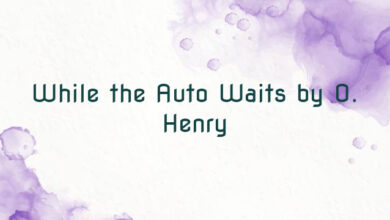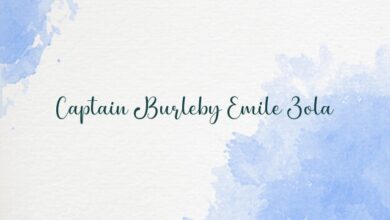
Oil of Dog by Ambrose Bierce
My name is Boffer Bings. I was born of honest parents in one of the humbler walks of life, my father being a manufacturer of dog-oil and my mother having a small studio in the shadow of the village church, where she disposed of unwelcome babes. In my boyhood I was trained to habits of industry; I not only assisted my father in procuring dogs for his vats, but was frequently employed by my mother to carry away the debris of her work in the studio. In performance of this duty I sometimes had need of all my natural intelligence for all the law officers of the vicinity were opposed to my mother’s business. They were not elected on an opposition ticket, and the matter had never been made a political issue; it just happened so. My father’s business of making dog-oil was, naturally, less unpopular, though the owners of missing dogs sometimes regarded him with suspicion, which was reflected, to some extent, upon me. My father had, as silent partners, all the physicians of the town, who seldom wrote a prescription which did not contain what they were pleased to designate as Ol. can. It is really the most valuable medicine ever discovered. But most persons are unwilling to make personal sacrifices for the afflicted, and it was evident that many of the fattest dogs in town had been forbidden to play with me–a fact which pained my young sensibilities, and at one time came near driving me to become a pirate.
Looking back upon those days, I cannot but regret, at times, that by indirectly bringing my beloved parents to their death I was the author of misfortunes profoundly affecting my future.
One evening while passing my father’s oil factory with the body of a foundling from my mother’s studio I saw a constable who seemed to be closely watching my movements. Young as I was, I had learned that a constable’s acts, of whatever apparent character, are prompted by the most reprehensible motives, and I avoided him by dodging into the oilery by a side door which happened to stand ajar. I locked it at once and was alone with my dead. My father had retired for the night. The only light in the place came from the furnace, which glowed a deep, rich crimson under one of the vats, casting ruddy reflections on the walls. Within the cauldron the oil still rolled in indolent ebullition, occasionally pushing to the surface a piece of dog. Seating myself to wait for the constable to go away, I held the naked body of the foundling in my lap and tenderly stroked its short, silken hair. Ah, how beautiful it was! Even at that early age I was passionately fond of children, and as I looked upon this cherub I could almost find it in my heart to wish that the small, red wound upon its breast–the work of my dear mother–had not been mortal.
It had been my custom to throw the babes into the river which nature had thoughtfully provided for the purpose, but that night I did not dare to leave the oilery for fear of the constable. “After all,” I said to myself, “it cannot greatly matter if I put it into this cauldron. My father will never know the bones from those of a puppy, and the few deaths which may result from administering another kind of oil for the incomparable ol. can. are not important in a population which increases so rapidly.” In short, I took the first step in crime and brought myself untold sorrow by casting the babe into the cauldron.
The next day, somewhat to my surprise, my father, rubbing his hands with satisfaction, informed me and my mother that he had obtained the finest quality of oil that was ever seen; that the physicians to whom he had shown samples had so pronounced it. He added that he had no knowledge as to how the result was obtained; the dogs had been treated in all respects as usual, and were of an ordinary breed. I deemed it my duty to explain–which I did, though palsied would have been my tongue if I could have foreseen the consequences. Bewailing their previous ignorance of the advantages of combining their industries, my parents at once took measures to repair the error. My mother removed her studio to a wing of the factory building and my duties in connection with the business ceased; I was no longer required to dispose of the bodies of the small superfluous, and there was no need of alluring dogs to their doom, for my father discarded them altogether, though they still had an honorable place in the name of the oil. So suddenly thrown into idleness, I might naturally have been expected to become vicious and dissolute, but I did not. The holy influence of my dear mother was ever about me to protect me from the temptations which beset youth, and my father was a deacon in a church. Alas, that through my fault these estimable persons should have come to so bad an end!
Finding a double profit in her business, my mother now devoted herself to it with a new assiduity. She removed not only superfluous and unwelcome babes to order, but went out into the highways and byways, gathering in children of a larger growth, and even such adults as she could entice to the oilery. My father, too, enamored of the superior quality of oil produced, purveyed for his vats with diligence and zeal. The conversion of their neighbors into dog-oil became, in short, the one passion of their lives–an absorbing and overwhelming greed took possession of their souls and served them in place of a hope in Heaven–by which, also, they were inspired.
So enterprising had they now become that a public meeting was held and resolutions passed severely censuring them. It was intimated by the chairman that any further raids upon the population would be met in a spirit of hostility. My poor parents left the meeting broken-hearted, desperate and, I believe, not altogether sane. Anyhow, I deemed it prudent not to enter the oilery with them that night, but slept outside in a stable.
At about midnight some mysterious impulse caused me to rise and peer through a window into the furnace-room, where I knew my father now slept. The fires were burning as brightly as if the following day’s harvest had been expected to be abundant. One of the large cauldrons was slowly “walloping” with a mysterious appearance of self-restraint, as if it bided its time to put forth its full energy. My father was not in bed; he had risen in his night clothes and was preparing a noose in a strong cord. From the looks which he cast at the door of my mother’s bedroom I knew too well the purpose that he had in mind. Speechless and motionless with terror, I could do nothing in prevention or warning. Suddenly the door of my mother’s apartment was opened, noiselessly, and the two confronted each other, both apparently surprised. The lady, also, was in her night clothes, and she held in her right hand the tool of her trade, a long, narrow-bladed dagger.
She, too, had been unable to deny herself the last profit which the unfriendly action of the citizens and my absence had left her. For one instant they looked into each other’s blazing eyes and then sprang together with indescribable fury. Round and round, the room they struggled, the man cursing, the woman shrieking, both fighting like demons–she to strike him with the dagger, he to strangle her with his great bare hands. I know not how long I had the unhappiness to observe this disagreeable instance of domestic infelicity, but at last, after a more than usually vigorous struggle, the combatants suddenly moved apart.
My father’s breast and my mother’s weapon showed evidences of contact. For another instant they glared at each other in the most unamiable way; then my poor, wounded father, feeling the hand of death upon him, leaped forward, unmindful of resistance, grasped my dear mother in his arms, dragged her to the side of the boiling cauldron, collected all his failing energies, and sprang in with her! In a moment, both had disappeared and were adding their oil to that of the committee of citizens who had called the day before with an invitation to the public meeting.
Convinced that these unhappy events closed to me every avenue to an honorable career in that town, I removed to the famous city of Otumwee, where these memoirs are written with a heart full of remorse for a heedless act entailing so dismal a commercial disaster.




